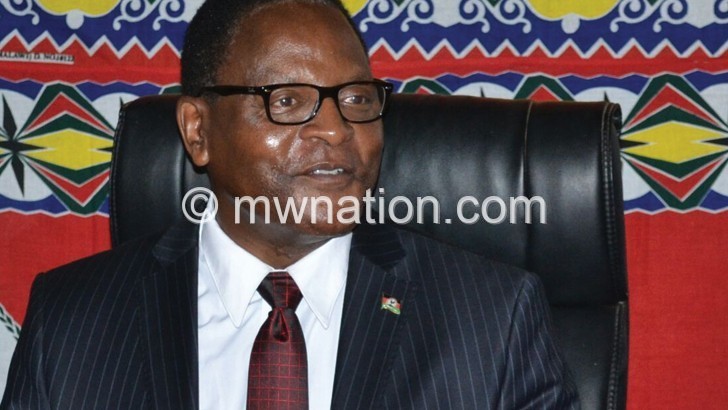MCP to trim presidential powers
With a continued outcry of concentration of power in the Presidency, Malawi Congress Party (MCP), like the DPP in 2014, has pledged to trim presidential powers should they get into government in the forthcoming polls.
This is part of the manifesto which the MCP launched yesterday at a decorated event in Lilongwe, making it the first political party to share its manifesto two months before the highly anticipated May 21 tripartite elections.

The party’s plan to turn around the country if given mandate is enshrined in five priority areas namely public administration and governance; economic growth and development; social development; infrastructure development; and homeland security and foreign policy.
Promises, in part, the MCP manifesto: “Reduce presidential powers in public appointments to ensure that the bureaucracy is served by the best and brightest minds. Reduce the size of the presidential convoy to less than 10 vehicles but without compromising the security of the Head of State”.
The party also promises to maximise on the failure by the Democratic Progressive Party (DPP) to implement the same pledge it made in 2014.
The DPP’s 2014 election manifesto reads: “The DPP government will reduce concentration of power in the Presidency.”
The DPP particularly promised to reduce the President’s powers in some appointments, including those of directors for governance and other public institutions, a promise which has not been fulfilled to date.
On education, the MCP has made a bold stand to declare that it will abolish the contentious quota system of selecting students into public schools: secondary and universities—a matter most political parties avoided in 2014.
MCP’s plan for education is quite colourful as it considers all faculties—from early childhood to tertiary education. What makes it even more interesting is the it is expected to make some of the promises a reality should voters do them a favour on May 21.
“Ensure that all secondary schools have electricity within the first three years of the MCP government, either from the national grid or alternative sources such as solar. Re-introduce the Junior Certificate of Education as a strategy to monitor and improve students’ academic progress and performance during their secondary school education,” reads the manifesto under Education.
Commenting on this, education activist Benedicto Kondowe, who was present during the launch of the blueprint, said he has noted with gratitude that MCP’s plan is inclusive.
“There are a number of good elements that MCP has listed which aim at revitalising the education sector. But launching the manifesto is one thing; we are eager to see how MCP, if voted into power, will put to practice what they have committed to deliver. If not MCP, we will still be eager to see whichever party forms government will translate their manifesto into reality to transform the education sector,” he observed.
Knowing that the civil service is a backbone of any administration, MCP has promised to raise the tax-free bracket from the current K35 000 to K100 000 (185 percent increase). It also promises to raise the minimum wage by 100 percent—from K25 000 to K50 000.
In a telephone interview yesterday, Economists Association of Malawi (Ecama) president Chikumbutso Kalilombe said while these increases can easily be declared and approved by Parliament, government needs to consider the resource envelope.
“It is possible to raise the tax-free bracket by that margin,same as minimum wage. On tax-free bracket, we must consider revenue; where do we get resources to finance that? So I would be happy to hear more on strategises that will improve revenue collection before we make so many promises”.
“On minimum wage, we need to improve the business environment. It would be difficult for employers to stick to that minimum wage in the face of a Let us help business to grow and the rest will fall in place,” he said Kalilombe. hostile business environment.
With persistent blackouts facing the country, MCP says it will increase electricity generation to 2 000 megawatts (MW) within the first three years and to 5 000 MW in 10 years.
The party, talks about construction of dams for hydro power as well as the use of solar energy among other proposed interventions. Malawi has failed to produce more than 350 MW 55 years after attaining independence, which makes the MCP promise more ambitious.
But Kalilombe cautioned parties to avoid making unrealistic promises for the sake of electioneering. He found the MCP promise to increase electricity generation capacity to 2 000 within three years as a larger-than-life promise.
“Combine all sites; Nkula A, Nkula B, Kapichira and Wovwe produce just about 300 megawatts. So let’s say each dam produces 10 megawatts it means MCP will need to create 200 dams because I can’t imagine having a dam which produces up to 100 megawatts. The intention to improve electricity is good but it ought to be realistic” he said.
3





